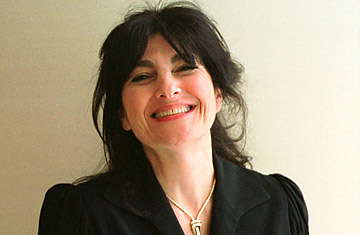
Ruth Reichl, editor of Gourmet magazine
Ruth Reichl, editor-in-chief of Gourmet magazine and former New York Times restaurant critic, had a mother who was a terrible cook. So it's fairly obvious that Reichl grew up into a very different woman than the one who raised her. The differences do not end there, however. In her newest book, Not Becoming My Mother (and Other Things She Taught Me Along the Way), Reichl examines her mom's old letters and explores her parent's ideas about young women (pretty is more important than smart) as well as her mother's bipolar disorder. Reichl talked to TIME about confessing dark secrets through memoir, why women should work and how the recession is affecting haute cuisine.
Was it hard to write honestly about your mother's bipolar disorder and her shortcomings as a parent?
In my first book, I tried very hard to not deal with any of my mother's emotional problems because I knew that they would embarrass her. She wasn't alive anymore, but still she was there in my head. But my editor said that I had to. I thought, "Well, hey, it's a memoir. All right. I'll confess she was bipolar." I felt bad about it. But you have to tell the truth and let the chips fall where they're going or not be a writer.
Do you write letters?
I write a lot of e-mails and I actually print out e-mails to keep for the future. I think it's a luddite mistake to think writing a letter on the computer is different than writing a regular letter. It's communication. It doesn't matter if you write beautiful cursive.
In many ways, this is a book about feminism. Do you think we still have a long way to go?
Absolutely. It has changed, but not nearly enough. The fact is that if you're a mother today, you feel guilty the whole time your kid is growing up. We still have not gotten the debate to the place where two people are parenting. It's just accepted that of course it's going to be the woman who's the primary parent. It's the woman who's going to sublimate her desire for a job. The fact that we're still debating that drives me crazy.
When [my son] Nick was in school, there were all these women who had given up their jobs to be stay-at-home moms and they all sort of glared at you when you didn't do your share at the PTA. Now as we're going into this recession, it's all going to come back. As jobs become scarcer, women are going to bear the brunt of it. I do think that one of the great lessons that I learned from my mother was not just the necessity of working, but that being able to work is a privilege for all of us. It's where we get our sense of self worth.
Your book is called Not Becoming My Mother. Are there things you've done in life that you want your son to avoid?
It's kind of apples and oranges. What I learned from going through my mother's notes and letters is how important it is to let your kid be whoever they're going to be. And my son turned out to be the person I would have always wanted him to be. Lucky for me.
How do you think the recession is affecting the way people eat?
I'm sort of thrilled. We're a country that wastes half the food we import. With the recession, people are learning to cook and learning to cook more mindfully, opening their homes to their friends again instead of spending all their private time in public places [like restaurants]. Michelle Obama out there planting a garden on the White House lawn is a wonderful message. For someone like me who's spent my whole life trying to get people to go into the kitchen, wow!
It seems like ultra high-end restaurants and celebrity chefs have grown up into a whole culture while the economy was expanding. Do you think there was a culinary bubble?
I think the great restaurants will absolutely endure, but they'll go back to what they should be which is special occasion places. The less good ones will go out of business. You're already seeing a lot of chefs doing really interesting things, understanding that on weeknights, when people aren't celebrating their anniversaries, they have to be more creative. Really good chefs are thinking, "Oh, let's see, how can I make $10 entrees?"
What was the last thing that you cooked?
Last night I was home alone for dinner. And I made fried rice with leftover Chinese rice that was in the refrigerator. I added some shitake mushrooms and scallions and some egg.
